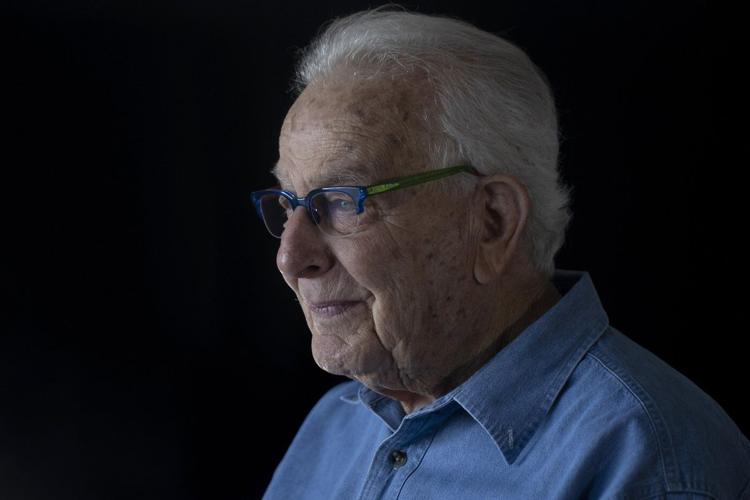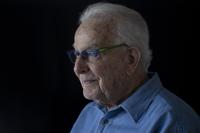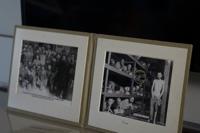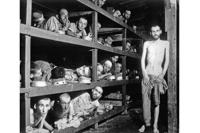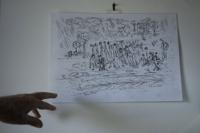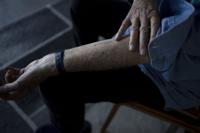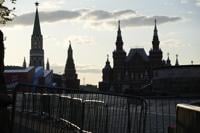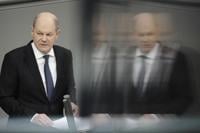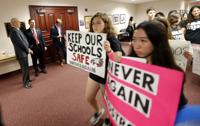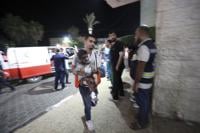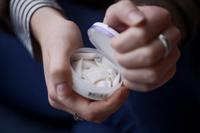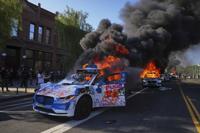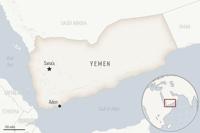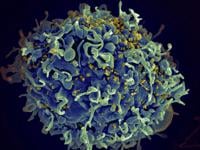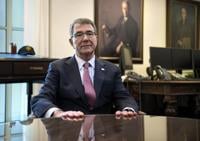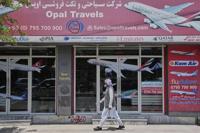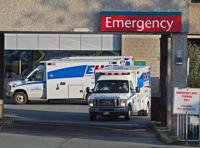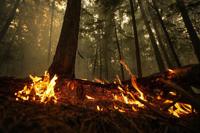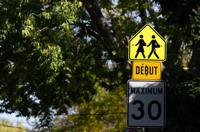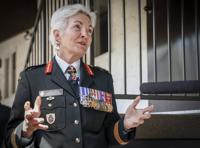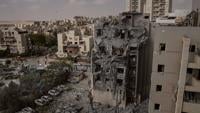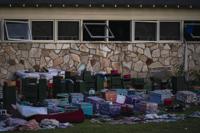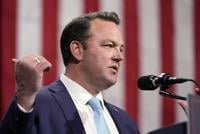HAIFA, Israel (AP) — Naftali Fürst will never forget his first view of the Auschwitz-Birkenau concentration camp, on Nov. 3, 1944. He was 12 years old.
SS soldiers threw open the doors of the cattle car, where he was crammed in with his mother, father, brother, and more than 80 others. He remembers the tall chimneys of the crematoria, flames roaring from the top.
There were dogs and officers yelling in German “get out, get out!” forcing people to jump onto the infamous ramp where Nazi doctor Josef Mengele separated children from parents.
Fürst, now 92, is one of a able to share first-person accounts of the horrors they endured, as the world marks the 80th anniversary of the liberation of the Nazis’ most notorious death camp. Fürst is returning to Auschwitz for the occasion, his fourth trip to the camp.
Each time he returns, he thinks of those first moments there.
“We knew we were going to certain death,” he said from his home in Haifa, northern Israel, earlier this month. “In Slovakia, we knew that people who went to Poland didn’t return.”
Strokes of luck
Fürst and his family arrived at the entrance to Auschwitz on Nov. 3, 1944 -– one day after Nazi leader Heinrich Himmler ordered the cessation of the use of the gas chambers ahead of their demolition, as the Soviet troops neared. The order meant that his family wasn’t immediately killed. It was one of many small bits of luck and coincidences that allowed Fürst to survive.
“For 60 years, I didn’t talk about the Holocaust, for 60 years I didn’t speak a word of German even though it’s my mother tongue,” said Fürst.
In 2005, he was invited to attend the ceremony to mark the 60th anniversary of the liberation of Buchenwald, where he was liberated on April 11, 1945, after being moved there from Auschwitz. He realized there were fewer and fewer Holocaust survivors who could give first-person accounts, and decided to throw himself into memorial work. This will be his fourth trip to a ceremony at Auschwitz, having also met Pope Francis there in 2016.
Some 6 million European Jews were — the mass murder of Jews and other groups before and during World War II. Soviet Red Army troops liberated Auschwitz-Birkenau on Jan. 27, 1945, and the day has become known as International Holocaust Remembrance Day. An estimated 1.1 million people, mostly Jews, were killed in Auschwitz-Birkenau.
Just 220,000 Holocaust survivors are still alive, according to the Conference on Jewish Material Claims Against Germany, and more than 20 percent are over 90.
A meeting place after the war
Fürst, originally from Bratislava, then part of Czechoslovakia, was just 6 when the Nazis first started implementing measures against the country’s Jews.
He spent ages 9 to 12 in four different concentration camps, including Auschwitz. His parents had planned to jump off of the cattle car on the way to the camp, but people were packed so tightly they couldn’t reach the doors.
His father instructed the entire family, no matter what, to meet at 11 Šulekova Street in Bratislava after the war. Fürst and his brother were separated from their mother. After numbers were tattooed on their arms, they also were taken from their father. They lived in Block 29, without many other children. As the Soviet army closed in on the area, so close they could hear the booms from the tanks, Fürst and his brother, Shmuel, were forced to join a dangerous journey toward Buchenwald, marching for three days in the cold and snow. Anyone who lagged behind was shot.
“We had to prove our desire to live, to do another step and another step and keep going,” he said. Many people gave up, longing to end the hunger and thirst and cold, and just sat down, where they were shot by the guards.
“We had this command from my father: ‘You must adapt and survive, and even if you’re suffering, you must come back,’” Fürst recalled.
Fürst and his brother survived the march, and an open-car train ride in the snow, but they were separated at the next camp. When Fürst was liberated from Buchenwald, captured in a famous photo that included Nobel laureate Elie Wiesel in the bunkbeds, he was sure he was alone in the world.
But within months, just as Fürst's father had instructed, the four family members reunited at the address they memorized, the home of family friends. The rest of their family –- grandparents, aunts, uncles — were all killed. His family later moved to Israel, where he married, had a daughter, four grandchildren and three great-grandchildren, with another on the way.
‘We couldn’t imagine this tragedy'
On Oct. 7, 2023, Fürst awoke to the Hamas attack on southern Israel, and immediately thought of his granddaughter, Mika Peleg, and her husband, and their 2-year-old son, who live in , a kibbutz on the border with Gaza where scores of people were killed or kidnapped.
“It just kept getting worse all day, we couldn’t get any information what was happening with them,” said Fürst. “We saw the horrors, that we couldn’t imagine this type of horror is happening in 2023, 80 years after the Holocaust.”
Toward midnight on Oct. 7, Peleg’s neighbors sent word that the family had survived. They spent almost 20 hours locked inside their safe room with no food or ability to communicate. Her husband’s parents, who both lived on Kfar Aza, were killed.
Despite his close connection, comparisons between Oct. 7 and the Holocaust make Fürst uncomfortable.
“It’s awful and terrible and a catastrophe, and hard to describe, but it’s not a Holocaust,” he said. As awful as the Hamas attack was for his granddaughter and others, the Holocaust was a multi-year “death industry” with massive infrastructure and camps that could kill 10,000 people a day for months at a time, he said.
Fürst, who was previously involved in coexistence work between Jews and Arabs, said his heart also goes out to Palestinians in Gaza, although he believes Israel needed to respond militarily. “I feel the pain of everyone who is suffering, everywhere in the world, because I think I know what suffering is,” he said.
Fürst knows that he is one of very few Holocaust survivors still able to travel to Auschwitz, so it’s important for him to be present there to mark the 80th anniversary.
These days, he is telling his story as many times as he can, taking part in documentaries and movies, serving as the president of the Buchenwald Prisoner’s Association and working to create a memorial statue at the Sered' concentration camp in Slovakia.
He feels a responsibility to be the mouthpiece for the millions who were killed, and people can relate to the story of a single person more than the hard numbers of 6 million deaths, he said.
“Whenever I finish, I tell the youth, the fact that you were able to see living testimony (from a Holocaust survivor) puts a requirement on you more than someone who did not: you take it on your shoulders the obligation to continue to tell this.”
___
This version corrects the date of Fürst’s arrival at Auschwitz to 1944, not 1943, in the seventh paragraph. It also corrects the date of liberation of Buchenwald to April 11, 1945, not 1944.

